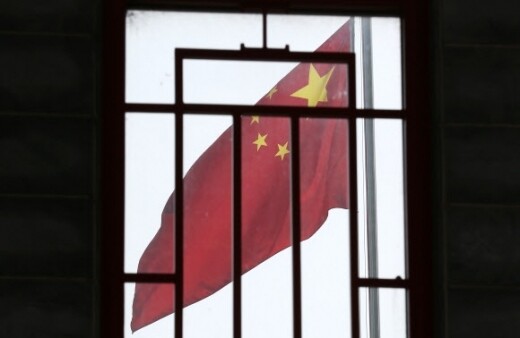hankyoreh
Links to other country sites 다른 나라 사이트 링크
Chinese media keeps up its criticism of South Korea’s THAAD deployment

While China’s state-run media focused on the Rio Olympics on Aug. 5, the day of the Olympics opening ceremony, they did not reduce their coverage of the planned deployment of the THAAD missile defense system in South Korea.
State-run China Central Television (CCTV), a news channel, was still covering THAAD as its leading story during the daytime hours. A program on the topic that lasted for about 10 minutes covered the mood in Seongju County, North Gyeongsang Province, where THAAD is supposed to be deployed; an interview with a Russian expert; and a political analysis titled “American Ambitions and Global Worries.”
During an editorial on Friday, the People’s Daily, the official newspaper of the Communist Party of China, criticized the arguments made by some in South Korea that China is responsible for the North Korean nuclear issue.
The editorial noted that South Korean government officials and some newspapers are making “bizarre and illogical” remarks about how “China ought to reflect on whether it has done all it can to address the North Korean nuclear issue.” “Does South Korea really want to see what it would be like if things took a different turn?” the editorial asked sarcastically. This can also be seen as a threat, suggesting that South Korea should not expect China to cooperate in the future in regard to North Korean affairs.
Similar thoughts were expressed in an editorial by state-run newspaper China Daily. “Because of concerns about security, China at one time joined the US-led trio [South Korea, the US and Japan] in UN sanctions against Pyongyang, but THAAD represented a death sentence for that brief united front,” the editorial said. “China is suffering the pain of being stabbed in the back by them [South Korea, the US and Japan], so how can they expect Beijing to put itself in danger?”
“Pyongyang’s nuclear and missile ability have thrived in the past amid such division, and it is likely that they will do so again,” the editorial added.
The People’s Daily Overseas Edition devoted the entirety of page 10 to an article titled, “Watch out for domino effect that THAAD will bring.”
“Deploying THAAD in South Korea could have a domino effect,” Fang Xiuyu, a professor at Fudan University’s School of International Relations and Public Affairs, told the newspaper. She argued that the US, which “is capable of anything,” could also deploy THAAD in Taiwan and the Philippines.
By Kim Oi-hyun, Beijing correspondent
Please direct questions or comments to [english@hani.co.kr]

Editorial・opinion
![[Editorial] Yoon must halt procurement of SM-3 interceptor missiles [Editorial] Yoon must halt procurement of SM-3 interceptor missiles](https://flexible.img.hani.co.kr/flexible/normal/500/300/imgdb/child/2024/0501/17145495551605_1717145495195344.jpg) [Editorial] Yoon must halt procurement of SM-3 interceptor missiles
[Editorial] Yoon must halt procurement of SM-3 interceptor missiles![[Guest essay] Maybe Korea’s rapid population decline is an opportunity, not a crisis [Guest essay] Maybe Korea’s rapid population decline is an opportunity, not a crisis](https://flexible.img.hani.co.kr/flexible/normal/500/300/imgdb/original/2024/0430/9417144634983596.jpg) [Guest essay] Maybe Korea’s rapid population decline is an opportunity, not a crisis
[Guest essay] Maybe Korea’s rapid population decline is an opportunity, not a crisis- [Column] Can Yoon steer diplomacy with Russia, China back on track?
- [Column] Season 2 of special prosecutor probe may be coming to Korea soon
- [Column] Park Geun-hye déjà vu in Yoon Suk-yeol
- [Editorial] New weight of N. Korea’s nuclear threats makes dialogue all the more urgent
- [Guest essay] The real reason Korea’s new right wants to dub Rhee a founding father
- [Column] ‘Choson’: Is it time we start referring to N. Korea in its own terms?
- [Editorial] Japan’s rewriting of history with Korea has gone too far
- [Column] The president’s questionable capacity for dialogue
Most viewed articles
- 1Months and months of overdue wages are pushing migrant workers in Korea into debt
- 2At heart of West’s handwringing over Chinese ‘overcapacity,’ a battle to lead key future industries
- 3Seoul getting its first-ever vertical farm
- 4Fruitless Yoon-Lee summit inflames partisan tensions in Korea
- 5Trump asks why US would defend Korea, hints at hiking Seoul’s defense cost burden
- 6[Editorial] Yoon must halt procurement of SM-3 interceptor missiles
- 7[Editorial] New weight of N. Korea’s nuclear threats makes dialogue all the more urgent
- 8Dermatology, plastic surgery drove record medical tourism to Korea in 2023
- 9Under conservative chief, Korea’s TRC brands teenage wartime massacre victims as traitors
- 10Gangnam murderer says he killed “because women have always ignored me”